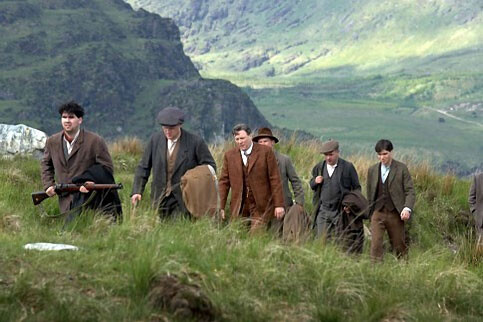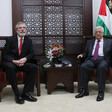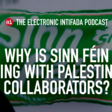The Electronic Intifada 29 September 2006

A still from The Wind That Shakes the Barley, UK director Ken Loach’s feature film set during the Irish Civil War in the 1920s
Watching The Wind That Shakes the Barley, UK director Ken Loach’s new feature film set mainly during the Irish Civil War in the early 1920’s, it is impossible not to make comparisons with contemporary events. Indeed Loach, whose film won the Palme D’Or at Cannes, has been quite explicit about his own view that the film is not merely an examination of the past, but a comment on the times we live in. Loach recently announced his support for the call by Palestinian film-makers, artists and others to boycott state sponsored Israeli cultural institutions and acknowledged that “Palestinians are driven to call for this boycott after forty years of the occupation of their land, destruction of their homes and the kidnapping and murder of their civilians.”
The film opens in 1920 in the rolling countryside of Ireland. A group of young men are playing a boisterous field game. As they get back to their village, they are confronted by British soldiers. Their crime had been to play Hurling, an ancient Irish sport similar to hockey. The British had banned the sport because of its identification with Irish nationalism, and because the hurley, the stick used to play it, was used by resistance fighters in their drills in lieu of difficult to obtain rifles. When one of the young men, Micheail, refuses to give his name to the British officer in English, he is beaten to death in front of his family and friends, galvanizing them to rally to the cause of the Irish Republican Army, fighting to rid Ireland of British rule.
This painful scene is a timeless reminder that colonial rulers—no matter how much they pretend to represent civilization and democracy—maintain their power in the manner of common street thugs: beating out people’s teeth and breaking their bones with rifle butts, and when that doesn’t work, torturing and killing them and destroying their homes. This mentality is alive and well in Palestine-Israel. The morning after I saw Loach’s film, I was confronted by two statements. The first was from the UN’s special rapporteur for Human Rights, the distinguished South African jurist John Dugard who declared that the situation Israel had created for ordinary Palestinians in Gaza was “intolerable, appalling, and tragic” and that Israel had turned Gaza into a giant “prison” and “thrown away the key.” The second statement came from Israel’s Trade Minister Eli Yishai who demanded that Israel should completely raze Palestinian villages in Gaza until Palestinians learn to submit quietly to their fate. “And to do this village after village until they stop firing rockets against us.”
Yet The Wind That Shakes the Barley is no feel-good story of a heroic indigenous resistance battling against the foreign occupier. The narrative is centred on two characters Damien (Cillian Murphy) and Teddy (Padraic Delaney), brothers who grow up to fight side by side against the British, but then find themselves on opposite sides in the brutal civil war.
Several events are key to understanding the civil war. In 1916 a group of Irish nationalist and socialist leaders staged the Easter Rising in Dublin, proclaiming an independent “Irish Republic.” At the time they had relatively little popular support, and the rising failed. But the brutal British response, which included executing the leaders of the uprising, spurred growing hostility to British rule. In the 1918 general election to the British parliament, the nationalist party Sinn Féin won a landslide on a platform of total independence from Britain. Although its members refused to take seats in the British parliament, they met in Dublin in January 1919 and ratified the 1916 proclamation of the Irish Republic. The Irish Republican Army, resisting the British, were adopted as the armed forces of this state. The British banned the self-proclaimed Irish parliament, and moved to crush Irish resistance — the same violent approach the British took to the leaders of the 1936-39 Palestinian uprising.
Exhausted by the war, leaders of the Irish Republic signed the Anglo-Irish Treaty with the British government in 1921. This established not an independent Ireland, but an “Irish Free State,” a dominion of the British Empire, whose officials would have to swear an oath of allegiance to the British Crown. The Treaty also partioned Ireland; the Free State’s jurisdiction extended only to twenty-six counties, while six counties in the north, became Northern Ireland, created to allow the Protestant minority, mostly descended from settlers and loyal to the British but with centuries-old roots in the country, to have their own state.
The Treaty bitterly split the Irish nationalist movement. Those loyal to the Irish Republic of 1919 saw it as an enormous betrayal of the independence struggle. I will not be giving too much away by saying that the personal consequences for the protagonists in the film are catastrophic. In real life, families and communities were torn apart and this dark period left a bitter legacy that defined the main faultline in Irish politics for most of the years since.
Through Palestinian eyes there is a strong echo with the split that has emerged on the one hand between those who view the 1993 Oslo Accords and a two-state solution (with a Palestinian state to be created in a tiny fraction of Palestine) as a reasonable and desirable settlement with Israel, and those on the other who view the accords as a sell-out that allowed Israel to maintain and expand its colonial rule of Palestinians under the guise of a ‘peace process.’ European Union officials like to make the comparison between modern Sinn Féin in Northern Ireland renouncing armed struggle for purely political means with what they hope Hamas will do. The comparison they do not mention is between the banning of the Sinn Féin MPs who won the 1918 election and Israel’s wholesale kidnapping of Hamas legislators freely elected by Palestinians under occupation in 2006.
Early in The Wind That Shakes the Barley, we see Irish resistance fighters being tortured by British officers in a prison. We see the same prison again later, but now Free State officers are using it to hold and interrogate their Republican former comrades. Yet another scene so unfortunately reminiscent of what happened after Oslo. A key difference to celebrate is that across Palestinian society there remains a determination to avoid internal conflict even though Israel and the United States have often demanded that the Oslo-created security forces crush continued resistance to Israel just as the Free State army crushed and executed Irish Republicans with British-supplied weapons. Palestinians must strive to ensure that they are never pulled into such a trap.
Talk to almost anyone in Ireland today and they will tell you it is not so simple, so black and white as the film makes it appear. In 1949, the contested Free State became the Republic of Ireland, recognized by all but a small minority of Republicans. Today Ireland is a prosperous independent country and a member of the European Union, whose national mythology elides the Anglo-Irish Treaty and Civil War and celebrates the “martyrs” of the 1916 Easter Rising and the long struggle against British rule.
In the end it was possible to get the British out of most of Ireland, allowing independence, but that was not enough to bring peace. In the British-ruled six counties of the north, continued oppression of the Catholic population led to The Troubles, the thirty year war that broke out in 1968. Although violence has ended, a political settlement acceptable to all the people who live there seems only slightly closer than it was the day after partition. The basic structure of the conflict in Palestine-Israel today is like Northern Ireland writ large—two communities of roughly equal size with nowhere else to go brought into bloody confrontation by colonialism. There can be no solution that preserves the domination of one over the other and none that is good for everyone that comes out of violence. A just solution based on full equality is still be worked for and hoped for in Northern Ireland and in Palestine-Israel. But as The Wind That Shakes the Barley so movingly depicts, history does not always provide easy or happy endings that fit neatly with passionately held ideals.
Ali Abunimah is co-founder of The Electronic Intifada and author of One Country, A Bold-Proposal to End the Israeli-Palestinian Impasse (Metropolitan Books, 2006)
Related Links:





